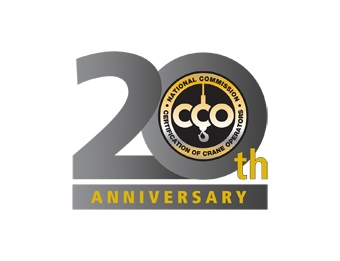The National Commission for the Certification of Crane Operators (NCCCO) as announced the twentieth anniversary of its professionally developed and nationally accredited personnel certification programs.
“Over the past two decades, CCO certification has made an indelible contribution to crane safety by establishing a national benchmark of the knowledge and skills needed to operate cranes,” said NCCCO President Thom Sicklesteel. “CCO certification, without question, is one of the most powerful tools available to an employer in ensuring only qualified personnel work with and around cranes.”
NCCCO was established in January 1995 as an independent, non-profit personnel certification organization following almost a decade of commitment by a group of industry volunteers dedicated to improving the safety of lifting operations. “They believed a major part of the solution to reducing the high rate of crane accidents lay in establishing effective performance standards for crane operators and those who work with them,” said NCCCO Chief Executive Officer, Graham Brent. “The result of this vision, determination and sheer hard work was a fair, valid and reliable assessment of crane operator knowledge and skills.”
NCCCO is preparing a slate of activities and announcements as part of a special twentieth Anniversary Recognition Program developed to mark the occasion. “We want to be sure that we recognize this historic milestone appropriately,” said Brent. “There’s a tremendous amount that administering almost one million examinations can tell us, and we’re excited about sharing that information with the industry, as well as outlining the role we believe professional certification can play in addressing such issues as the nation’s skills shortage.”
There would, Brent added, also be a powerful retrospective element, charting the achievements of NCCCO to date. Indeed, studies have demonstrated an 80 percent decline in crane-related fatalities in areas where professionally developed certification has been adopted. “Insurance companies, project owners and risk managers recognize the key role that CCO certification plays in workplace risk mitigation and the impact it has on the safety of crane operations overall,” he said. “CCO certification has been successful for one major reason: It works.”
“It’s been a remarkable journey,” said NCCCO Vice President Kerry Hulse, “one that has far exceeded the expectations of those who contributed their time and expertise to this effort for years even prior to the formation of NCCCO two decades ago.”
Hulse, who is Vice President, Deep South Crane & Rigging, Houston, Texas, was chairman of the original Certification Task Force established by the Specialized Carriers & Rigging Association (SC&RA) that ultimately led to the formation of NCCCO. He served as Chairman of the Commission from its inception until his election to the Board in 2012. He said, “That initial group of industry volunteers had one simple (albeit formidable) goal: To make this industry a safer place in which to work. And all the evidence is that they have achieved that.”
And the pace of adoption continues to grow, he added, noting the achievement of another milestone just last year when the 100,000th person to be certified through NCCCO programs was issued his CCO certification card.
News about NCCCO’s plans for its Twentieth Anniversary Recognition Program is available at: nccco.org/20Years, where regular updates on developments will also be posted as they occur.











